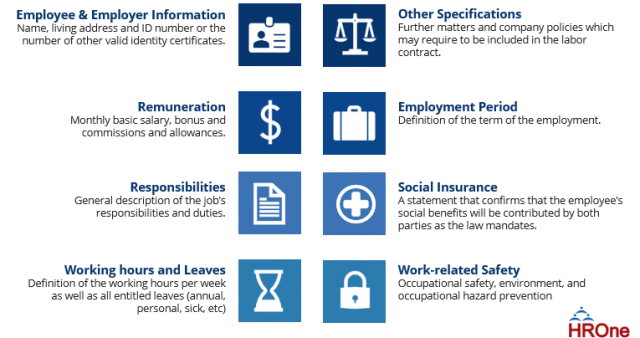When it comes to hiring employees in China, the employment/labor contract is the first priority an employer should prepare before hiring foreign or Chinese employees in China. Considering the complexity of Chinese labor laws and high employer liabilities a foreign entity shall undertake in hiring employees, the below guidelines and practices regarding employment contracts are extremely important and helpful for foreign companies preparing a comprehensive employment contract for hiring employees in China.

The below tips and guides are primarily for clients who have already registered a company in China and would like to hire the employees directly. If you are a representative office in China or you don’t have a legal entity status in China, an employment relationship shall only be established through a licensed PEO & Employment agency. For more information regarding establishing employment relationships without a legal entity in China, please click below.
Employment Contract Establishment in China
Employment contracts in China are governed by the Labor Contract Law of the People’s Republic of China, which outlines the legal framework for employment relationships between employers and employees in the country. The law requires employers to sign written employment contracts with their employees within one month of the start of their employment.
The employment contract must include various terms, including the nature of the work, the place of work, working hours, remuneration, social insurance, labor protection, and rest and leave. The contract must be in Chinese and should be signed by both the employer and the employee. The employer must provide the employee with a copy of the contract.
Employment contracts in China can be for a fixed term or an indefinite term. Fixed-term contracts are typically used for temporary positions or projects with a specific duration, while indefinite-term contracts are used for long-term employment relationships. Employers must provide employees with written notice before the end of their fixed-term contract if they do not intend to renew it.
Employers are required to comply with the terms of the employment contract and provide a safe and healthy working environment for their employees. Employees have the right to terminate their employment contract with notice or compensation in certain circumstances, such as if the employer violates labor laws or if the employee is not paid on time.
In addition to the Labor Contract Law, there are other laws and regulations that govern employment relationships in China, including the Social Insurance Law, the Labor Dispute Mediation and Arbitration Law, and the Employment Promotion Law. Employers operating in China should be familiar with these laws and regulations and ensure that their employment practices comply with them.
Mandatory Clauses within an Employment Contract in China

- The name, address, and legal representative or person in charge of the employer;
- The name, living address, and ID number or the number of other valid identity certificates of the employee;
- The term of the employment contract;
- The job responsibilities and the work location;
- Working hours, rest time, and vacation;
- Remuneration;
- Social insurance;
- Occupational safety, environment, and occupational hazard prevention; and
- Other matters which laws and regulations require to be included in employment contracts.
Types of Employment Contracts in China
There are three types of employment contract terms: fixed-term employment contract, non-fixed-term employment contract, and project-based employment contract when the term is based on the completion of a specific number of tasks.
An employer and employee may establish a non-fixed-term employment contract upon reaching a negotiated consensus. If an employee proposes or agrees to renew his/her employment contract under any of the following circumstances unless the employee proposes to conclude a fixed-term employment contract, a non-fixed-term employment contract shall be concluded:
- The employee has been working for the employer for a consecutive period of no less than ten years;
- When an employer is implementing the employment contract system for the first time, or when a state-owned company changes the ownership structure and renews the employment contracts, if the employee has been working for the employer for a consecutive period of no less than ten years and is less than ten years away from his/her statutory age of retirement; or
- If the renewal occurs after the consecutive conclusion of two fixed-term employment contracts, and the employee does not fall under any of the circumstances specified in Article 39, and Item 1 and Item 2 of Article 40 of the Employment Contract Law of the People’s Republic of China.

Probationary Period in China
In China, probationary periods are a common practice in employment contracts, especially for new employees. A probationary period is a trial period during which an employer evaluates the employee’s performance and suitability for the job, and the employee has the opportunity to assess the employer and the job.
The Labor Contract Law of the People’s Republic of China permits employers to set a probationary period of up to six months for non-technical positions and up to twelve months for technical positions. During the probationary period, the employer can terminate the employment contract with notice or compensation if the employee’s performance is unsatisfactory or if the employee violates company policies or regulations. The employee can also terminate the contract with notice, but without compensation.
The employment contract should clearly state the length of the probationary period, the job duties and responsibilities, the standards for evaluation, and the consequences of termination. The employer should provide the employee with orientation and training, assign appropriate tasks, and provide regular feedback and coaching.
It is important to note that during the probationary period, the employee is entitled to the same legal rights and benefits as regular employees, including minimum wages, working hours, rest and leave, social insurance, and labor protection. The employer should comply with labor laws and regulations and treat the employee fairly and impartially.
If the employer decides to terminate the employment contract during the probationary period, they must provide the employee with a written notice and a termination certificate, and pay any outstanding wages and benefits. If the employee believes that the termination was unfair or illegal, they can file a complaint or a lawsuit with the labor arbitration commission or the people’s court.
In conclusion, probationary periods are an important part of the employment relationship in China, and they provide a mechanism for both employers and employees to assess each other before making a long-term commitment. Employers should use probationary periods responsibly and fairly, and employees should use them as an opportunity to learn and improve.

Salary During Probation Period in China
In China, the salary during the probation period is a common concern for both employers and employees. The probation period is a trial period during which an employer evaluates the employee’s performance and suitability for the job, and the employee has the opportunity to assess the employer and the job.
According to the Labor Contract Law of the People’s Republic of China, employees are entitled to the same legal rights and benefits during the probation period as regular employees, including minimum wages, working hours, rest and leave, social insurance, and labor protection. Therefore, the employer must pay the employee a salary that meets the minimum wage standards and the agreed terms in the employment contract.
However, some employers may offer a lower salary during the probation period as a way to manage their financial risks and incentivize employees to perform well. This practice is legal, as long as the salary meets the minimum wage standards and the agreed terms in the employment contract, and the employee agrees to the lower salary.
It is important to note that the salary during the probation period should be clearly stated in the employment contract, along with the length of the probation period, the job duties and responsibilities, the standards for evaluation, and the consequences of termination. The employer should provide the employee with orientation and training, assign appropriate tasks, and provide regular feedback and coaching.
If the employer decides to terminate the employment contract during the probation period, they must provide the employee with a written notice and a termination certificate, and pay any outstanding wages and benefits. If the employee believes that the termination was unfair or illegal, they can file a complaint or a lawsuit with the labor arbitration commission or the people’s court.
In short, the salary during the probation period in China should meet the minimum wage standards and the agreed terms in the employment contract, and the employee is entitled to the same legal rights and benefits as regular employees. Employers should use the probation period responsibly and fairly, and employees should use it as an opportunity to learn and improve.
Invalid Employment Contract in China
The following employment contract is invalid or is partially invalid:
- Either party uses deception, coercion or takes advantage of the other party in order to ensure the other party concludes the employment contract or makes the relevant amendment, which is contrary to his/her genuine will;
- An employer disclaims its liability or denies the employee’s rights; or
- The mandatory provisions of laws or administrative regulations are violated.
- The invalidity of any part of an employment contract does not affect the validity of the other parts of the contract. The other parts shall remain valid. [fusion_menu_anchor name=”legal” class=””][/fusion_menu_anchor]
If an employment contract has been deemed to be invalid, the employer shall pay compensation to employees who have worked for the employer. The amount of the compensation shall be equivalent to the compensation paid to employees with the same or similar positions of this employer.
Legal Risks for an Employment Relationship without an Employment Contract
There are legal risks associated with initiating an employment relationship without an employment contract for both the employer and employee.
Failure from the Employee to Sign the Labor Contract
If any employee, after being notified by the employer, fails to conclude a written employment contract with the employer within one month from the date he/she starts working, the employer shall terminate the employment relationship with the employee by notifying the employee in writing. In this case, the employer is not required to make any severance payment to the employee but shall pay the employee for his/her actual working time.
Employer Fail to Complete the Labor Contract
If an employer fails to conclude a written employment contract with an employee after the lapse of more than one month but less than one year from the date when he/she starts working, the employer shall pay to the employee double the amount of his/her monthly salaries according to Article 82 of the Employment Contract Law of the People’s Republic of China, and shall then conclude a written employment contract with the employee.
Liability of Non-established, Non-Fixed-Term Employment Contract
If an employer fails, in violation of the Law, to conclude a non-fixed-term employment contract with their employee, it shall pay to the employee double his/her monthly salaries. This double-salary rule starts from the date on which a non-fixed-term employment contract should have been concluded.
Legal Obligations of Employers in China
Provide a safe and healthy working environment
Employers in China have a legal obligation to provide a safe and healthy working environment for their employees. This is essential for the protection of employees’ physical and mental health, and to ensure that they can perform their job duties effectively and efficiently.
To fulfill this obligation, employers should conduct regular risk assessments, identify and eliminate hazards and risks, provide appropriate safety equipment and training, and establish emergency plans and procedures. Employers should also comply with relevant laws and regulations on occupational health and safety, such as the Law on the Prevention and Control of Occupational Diseases, and the Regulation on the Administration of Work Safety.
Employers should also take measures to prevent and address workplace harassment, discrimination, and violence, which can cause psychological harm to employees and create a hostile working environment. Employers should establish clear policies and procedures for reporting and addressing such incidents, and provide training and support for employees who experience or witness such behavior.
Failure to provide a safe and healthy working environment can result in legal and financial consequences for employers, as well as reputational damage. Therefore, employers should prioritize the well-being of their employees and take all necessary measures to ensure a safe and healthy working environment.
Comply with labor laws and regulations
Employers in China have a legal obligation to comply with labor laws and regulations, which are designed to protect the rights and interests of employees. These laws and regulations cover various aspects of the employment relationship, including working hours, wages and benefits, social insurance, rest and leave, and labor protection. Employers should ensure that they understand and comply with these laws and regulations, and should keep up-to-date with any changes or updates. Failure to comply with labor laws and regulations can result in legal and financial consequences, as well as damage to the employer’s reputation.
Treat employees fairly and impartially
Employers in China have an obligation to treat their employees fairly and impartially, without discrimination or bias. This means that employers should provide equal opportunities for all employees, regardless of their gender, age, race, ethnicity, religion, disability, or other personal characteristics.
To fulfill this obligation, employers should establish clear policies and procedures for hiring, promotion, evaluation, and termination, and should ensure that these policies and procedures are applied consistently and transparently. Employers should also provide training and development opportunities for all employees, and should encourage and recognize their achievements and contributions.
Employers should also respect employees’ privacy and confidentiality, and should not engage in any form of harassment, intimidation, or retaliation. Employers should establish clear channels for communication and feedback, and should listen to employees’ concerns and suggestions.
In addition, employers should comply with relevant labor laws and regulations on wages and benefits, working hours, rest and leave, social insurance, and labor protection. Employers should pay their employees a fair and reasonable wage, provide appropriate rest and leave, and ensure that their working conditions are safe and healthy.
Failure to treat employees fairly and impartially can result in low morale, high turnover, and legal and financial consequences for employers. Therefore, employers should prioritize the well-being and satisfaction of their employees, and should establish a positive and inclusive workplace culture based on mutual respect and trust.
Employment Contract Amendment in China
The contents of the employment contract can legally be amended if the parties reach a consensus through consultation. The amendment shall be in writing.
The employer and the employee shall both keep a copy of the amended employment contract.
If the amendment is not made in writing but is given orally, has already been in operation for more than one month, and the oral amendment is not in violation of the laws, administrative regulations, national policies, or public order and good customs, the People’s Court will not support the annulment of the amendment solely on the basis that said the amendment is not made in writing.
Get the guide to hire employees in China in 2021 and stay updated on the latest news about HR, employment, and business expansion in China!
Thank you!
You have successfully joined our subscriber list. Check your email to get your copy of the guide to hire employees in China!

